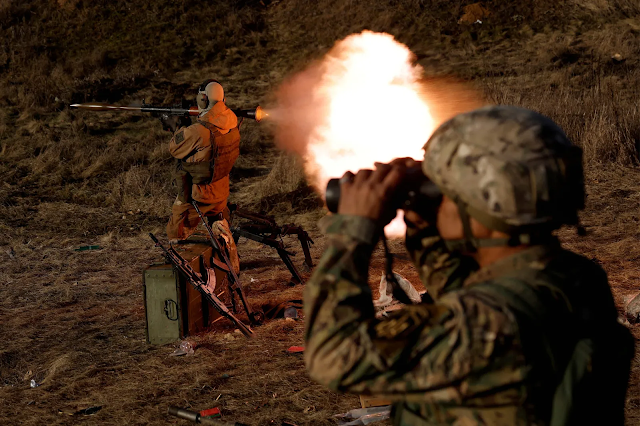Can a full-scale war be avoided as Middle Eastern tensions rise?
One of the holiest times of the year for both Jews and Muslims has seen another outbreak of violence in the Middle East.
Recent Israeli police raids on the Al-Aqsa mosque compound in Jerusalem prompted militants in southern Lebanon to launch a significant number of rockets at Israel in retaliation.
The attacks were attributed to the militant Hamas group, and Israel responded by attacking the Hamas-run Gaza Strip and Palestinian militias in Lebanon. This was the most concerning cross-border violence in 17 years.
Then Syria launched a rare rocket attack, which prompted more Israeli airstrikes against Syrian targets. After thousands of Israelis, including seven Cabinet ministers, marched to an evacuated settlement in the West Bank and demanded that it be made legal, clashes also broke out there.
These provocations are done for a variety of reasons, including anger, fear, retaliation, and frustration. These feelings are motivated by the horrifying Israeli occupation of Palestinian territories on the one hand, and rage at Palestinian terrorist attacks or an uncontrollable desire for Jewish hegemony on the other.
Extreme interpretations of nationalism or religion, or frequently a mix of the two, tend to exacerbate these feelings.
Since there is no military solution to the ongoing conflict between Israel and the Palestinians, these violent outbursts should be viewed as provocations.
The two main players, Israel and Hamas, are looking for deterrence. In determining how to respond when violence does occur, both sides must prioritize maintaining, achieving, or increasing deterrence.
Each side calculates how far it can cross the line without drawing a costly response from the other, caught between provocation, retaliation, and deterrence.
countless calculations
How to step up attacks against Israel while keeping Gaza out of the fighting is Hamas' primary concern. The intention is to bring Jerusalem, the West Bank, and Israel itself into the conflict over the Israeli occupation of Palestinian territories.
As soon as it can establish a connection between the provocation and Hamas, Israel tries to direct its military responses back to Gaza in recognition of this.
The militant organization in Lebanon called Hezbollah, which is collaborating more and more with Hamas, has a different set of considerations.
These include its long-standing conflict with Israel, a desire to make amends for past wrongdoings (such as the assassinations of Hezbollah leaders), religious fervor (such as sensitivity surrounding the Al-Aqsa Mosque), and Iranian directives.
However, the Israeli military responses and the need to balance Hezbollah's allegiance to Iran with its responsibility to the Lebanese people place restrictions on the organization. Hezbollah is already accused by many Lebanese of putting Iranian interests ahead of those of the country. It would be difficult for the organization if it was blamed for an expensive Israeli response against Lebanese territories.
Israel, on the other hand, worries about another costly conflict with Hezbollah. The group is believed to have an enormous rocket arsenal (more than 100,000), which includes high-end and long-range weapons that it could launch at will into Israel.
The strength and quantity of these weapons would be too much for the well-known Israeli Iron Dome air defense system to handle.
However, Israel's greatest concern is a simultaneous escalation on several fronts, including Hezbollah in Lebanon to the north, an Intifada-style uprising in East Jerusalem and the West Bank to the east, and Hamas and Islamic Jihad in Gaza to the south.
Palestinians, Jews, and security forces in Israel could form a fourth front in its cities. Additionally, a fifth front against Iranian forces stationed in Syria is always a possibility.
The preferred strategy for Israel to deal with these various threats would be to isolate the various actors by limiting its retaliation to only one provocation at a time. But it would not be simple.
Why there hasn't been an escalation yet between both sides
As we've seen recently, minor actors like Jewish settlers in the West Bank, Jewish nationalists inside Israel, and Palestinian militants in the occupied territories, inside Israel, or in southern Lebanon often provoke major actors or make things worse.
In the past, Israel, Hamas, and other organizations typically responded to such provocations with measured responses. To avoid being perceived by one's own people as weak, they intended to internally project strength and resolve. A measured response, however, also conveys to the opposing party a desire to prevent escalation.
The locations of the recent violent outbursts' targets serve as evidence of this. Hamas' decision to restrict rocket fire to Jewish communities in southern Israel rather than larger cities indicated a desire to avoid a significant escalation. Instead of primary command centers or important leaders, Israel may choose to target low-level Palestinian targets.
Uncertainty exists regarding the new, hard-line Israeli government's approach to the escalating violence.
Israel currently seems to prefer preventing an escalation. According to the most recent polls, the new ruling coalition is losing support and would not succeed in winning a majority of seats in parliament if elections were held right now. This could be the reason why more circumspect nationalist voices in government seem to be getting the upper hand, at least temporarily.
However, this mindset could be changed by either a serious incident at Al-Aqsa Mosque or a serious terrorist attack on Jews.
What is next?
On the (very) long road to peace, the international community must play a crucial role in pressuring or encouraging the various parties to make difficult but necessary concessions.
The advantages of the de-escalation techniques currently in use could be seen. However, if the main goal is to maintain deterrence, then an opener discussion about the dangers of violent provocations could provide perhaps better solutions.
There are only losers in the never-ending cycle of violence known as tit-for-tat.

.png)
Comments
Post a Comment